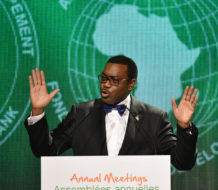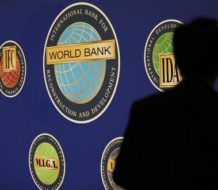The new head of the African Development Bank says his top priority is to develop the continent’s energy infrastructure to spur economic growth.
Akinwumi Adesina, known for his reforms and anti-corruption efforts as Minister of Agriculture and Rural Development of Nigeria, became president of the bank on September 1, 2015. The bank is one of Africa’s largest lending institutions and finances projects to improve electricity, water and transportation.
“My top priority will be to focus the Bank to deliver on “power-for-all” – a universal access to electricity for Africa. Nothing is more important to Africa than access to power,” Adesina said in his vision statement for his candidacy for president.
Lack of energy slows development
Adesina said lack of energy is the greatest obstacle to the development of the continent.
“The development of the energy infrastructure for Africa will drive more rapid economic and social development of the continent, by reducing the cost of doing business, powering industrial growth, unlocking entrepreneurship of millions of small and medium size enterprises, improving educational and health systems and deepening financial services, driving agro processing to create jobs,” he said.
He noted that Africa’s total energy capacity is only 147 GW – similar to that of Belgium. He wants to expand that to 700 GW by 2040 with development of renewable resources.
“Africa has 50% of the world’s renewable energy (wind, hydropower and solar) but they remain largely untapped,” he said.
Plans to fund large and small projects
He proposes a mix of large, regional projects and smaller local ones that can be developed quickly.
“The Bank cannot afford to put all its focus on large regional power projects alone, as they are very complex, have high capital exposure and risk profiles, will take time to achieve, even though they are critical,” he said.
“Under my leadership, the Bank will pursue a twin track approach: build success in the short term, deliver successful investments in power and then scale up based on success. To show quick successes, build momentum on execution and delivery for countries, the Bank will also focus on providing support for the piloting of decentralized integrated power systems within countries.”
Corruption is an obstacle
Another obstacle, he said, is corruption.
“The cost of corruption is massive; it turns the whole continent into darkness,” he said, estimating that corruption costs Africa $148 billion a year.
Africa looks to reduce carbon emissions
Adesina was a prominent voice for a unified African agenda at the recent Climate Conference in Paris and that agenda also stressed development of renewable energy sources in order to reduce greenhouse emissions.
At the time, he said Africa needs an international investment of $55 billion a year through 2030 to create an efficient energy sector that uses more renewable resources. He said the bank would contribute $5 billion in financing, 40 percent of its total investments.
Increased investment in private sector
In addition to pledging to make investments in the energy infrastructure, Adesina said the bank would increase its investments in the private sector.
He said private sector lending by the bank was $2.1 billion in 2013.
“Given that the private sector accounts for 70% of all investments in Africa, 70% of all output and 90% of all employment, there is need for the Bank to be more expansive in its private sector operations,” he said.
Adesina also said the bank will embrace an “activist” posture in support of infrastructure developments.
“The Bank will increasingly take on a transactional approach by helping countries and the private sector to resolve legal and regulatory environments that will unlock bottlenecks to project development and execution. The role of the Bank will be more of an “activist financier” that will be more engaged in driving the execution of infrastructure projects, not just ideas and master plans,” he said.
Known for agricultural reform in Nigeria
Adesina is a respected economist and agricultural expert.
Before joining the bank, he had been Minister of Agriculture and Rural Development in Nigeria since 2011. He was known for implementing bold reforms in the country’s agricultural sector, including anti-corruption efforts and infrastructure improvements. Agriculture had been long neglected as the West African country’s reliance on oil revenues grew.
During his tenure, domestic food production increased by 22 million tons while food imports decreased significantly.
In 2013, Adesina won the Forbes Africa Person of the Year award for his reforms in Nigeria’s agriculture sector. In 2014, he was selected as Anti-corruption Man of the Year and Most Transparent and Accountable Minister of the Federal Republic of Nigeria by the Foundation for Transparency and Accountability.
He holds a master’s degree and a PhD in agricultural economics from Purdue University.





[…] “The development of the energy infrastructure for Africa will drive more rapid economic and social development of the continent by reducing the cost of doing business, powering industrial growth, unlocking entrepreneurship, improving education and health systems and deepening financial services,” Adesina said. […]